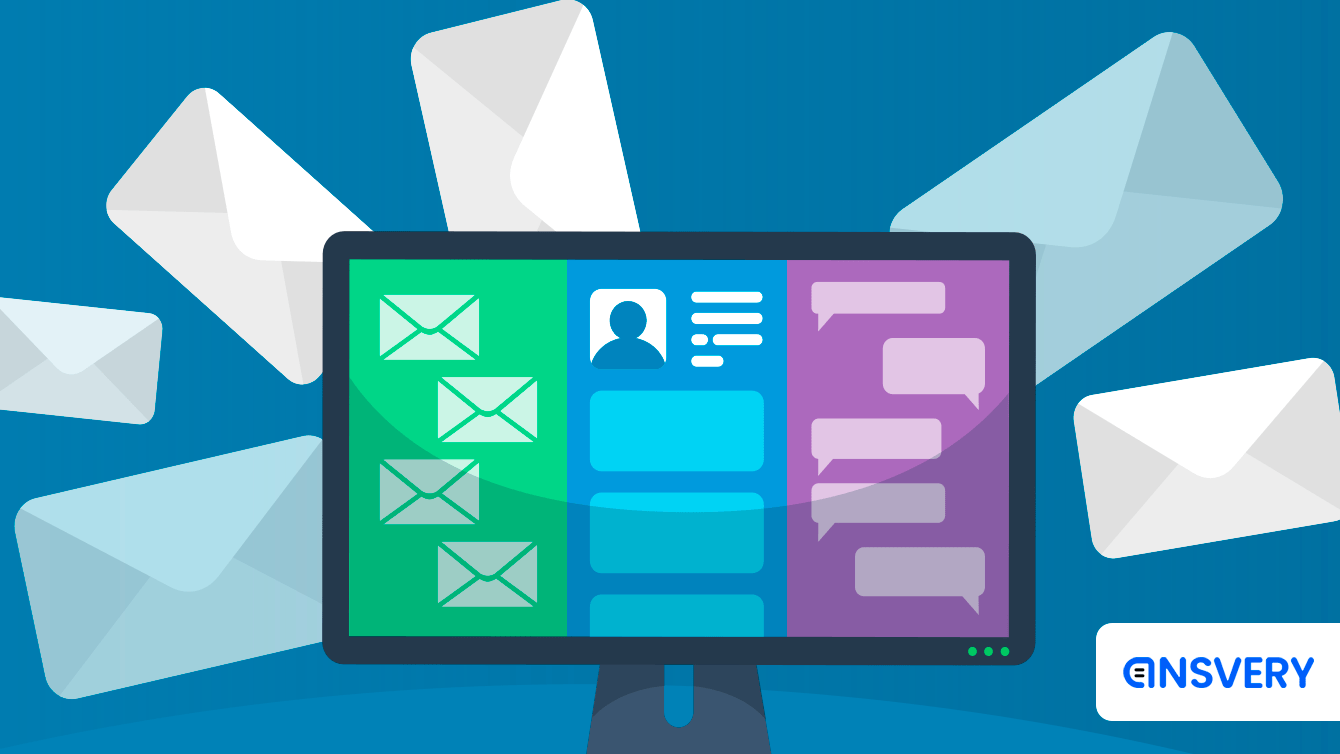Why It Is Crucial to Train Your Agents
The author of this article, Maria Filippova, is a learning and development specialist working for Ansvery support outsourcing team, in the QA department. Her main role is to analyze agents' performance, pinpoint growth areas, devise and implement complex education strategies, and provide regular training sessions. She helps new agents master user communication standards as well as find their own unique voice; and for experienced agents, there is a non-stop improvement program tailored to their needs as well as the demands of the customer service market.
She also claims that she now suffers from professional deformation and can't help but evaluate and assess all support services she ever addresses.
It all started when I received a call from an unknown number. At the time, I was expecting a delivery, so I picked up the phone.
“Yes?” I said cautiously.
On the other end of the line, there was a young man with a quiet and sad voice.
“Good afternoon, I represent YourFavouriteCompany ltd, and I would like to talk to you about your recent order. Could you tell me where you are located presently? Which town?”
I obliged.
“You see,” said the young man. “One of the items you had ordered was delivered to (he names a town in another region). Now we need to decide how to proceed in this situation.”
I already knew that they had sent a part of my order on a journey. I had already been nagging their chat support for three days about that – with no visible result. I raised my brow:
“I do see. But what I really want to know is how this happened.”
Without any hesitation and showing a complete lack of understanding of the situation, the young man boldly replied:
“Most likely, you made a mistake while selecting a delivery address.”
Read more: 7 Crucial Customer Support Mistakes
I was at him like a shot. Relentlessly, I lay down the facts. The support agent did not know what to answer but mostly muttered something undistinguishable and could not provide me with a plausible explanation. I needed to initiate a refund and there was nothing else to be done.
Our further discussion was edgy and tense. The agent couldn’t quite bring himself to give me clear instructions, and I was picking at him for his incompetence, getting worked up, demanding a more satisfactory solution, asking inconvenient questions and pouring down on his head all the frustration I’d accumulated during the previous three days while dealing with their chat support. And all this basically because of one wrong phrase at the beginning of the conversation: “Most likely, you made a mistake”...
The problem wasn’t even the fact that they had shoved a part of my order into a wrong delivery truck. (It is physically impossible for a customer to select two delivery addresses for different items in one order so that two of those went to one town and the third one to another). The problem was that instead of owning their mistake and apologizing, the agent decided that the best move would be to blame the customer. It was painfully obvious that he didn’t know how to talk to clients at all, and the more we spoke, the more I realized that no one had ever taught him how to do it.
Read more: Multichannel and Omnichannel Support: Best Ways to Organize User Communication
Some good reasons to train your support agents
Agent training is a painful subject and – understandably – my pet peeve. A lot of companies – even bigger ones – seem to believe that it is quite enough to hire a person who can more or less speak the required language, set them an account, send them a link to the game or app, equip them with some canned responses and – voila! – they will be ready to tackle hoards of users. But somehow, the miracle does not happen. In the end, customers end up with conversations similar to what I’ve described above; their loyalty and their desire to cooperate with the company dramatically decreases.
All this is hardly surprising though.
It is immensely difficult to find a person who will possess all the necessary skills and who will be able to provide quality customer service without any prior training or coaching. On the other hand, agents who lack the necessary expertise are unlikely to turn your support into a competitive advantage. They won’t be able to protect your company’s reputation. They won’t be able to offer your users sufficient explanations and clarifications, won’t be able to make a lively сonversation, won’t be able to retain your customers when they face troubles with the product and may decide to leave you. Quite the opposite, such agents will add to the overall irritation and disappointment and increase the users’ desire not to have anything to do with your company ever again. So the human factor will result in profit loss. And if you are particularly unlucky and your agent’s fail is truly epic, the user can share the whole conversation on the internet, and then you will lose not only your existing customer but also a large number of potential ones. For you know - people like to read reviews and rely on reviews. And a particularly vicious one can easily scare them off - there are plenty more apps in the store, so why take a risk with a potentially problematic one? And people also love sharing failure stories. Just google “bad support examples'', and I can guarantee that you’ll have a reading of your lifetime. A disastrous conversation with a support agent can easily go viral, and you will need plenty of ingenuity and resources if you wish to restore your reputation after such a blow.
Read more: Кey Support Trends: Learn from the Past and Change the Future
Support agents are your points of contact to the “outside world” of users. They broadcast your brand image as much as your official site, motto, and corporate colors do. They are not “the guards on the walls of the citadel” as they are sometimes seen, but your city guides that promote your most obvious attractions and try to present your less appealing recesses as charming peculiarities.
To get a successful mediator and avoid all the unpleasant scenarios mentioned above, your agents need to be trained and nurtured. And everything is of importance in this process - from selecting the seeds to collecting the harvest.
How to train your dragon agent
-
Stage 1: Selecting Candidates
Naturally, some training and education will help your agents develop their skills. But for this to happen, these skills should be there in the first place – at least at an embryo stage. Not every applicant can ultimately become a good support agent. And you should not only look at their general skill set and relevant experience (although they can also be vital). You also need to pay attention to their mindset, to their understanding of your culture, to their willingness to embrace this culture, and to their true desire to belong.
So a suitable candidate will possess several qualities that will eventually trigger growth.
For example, when we are searching for a new potential support agent for our support outsourcing team, we usually look for the following qualifications:
1. Good knowledge of the language they are meant to support
Firstly, we try to find out if the candidate’s grammar and spelling are good. For if an agent makes mistakes in their messages, users will immediately question their authority. Secondly, the richer vocabulary they have, the better. Agents will have to deal both with legal jargon and with modern slang and colloquial expressions. It is, of course, impossible to know all the words in the world. But the faster the agent can understand the message and the less they need to consult a dictionary, the more effective their work will be. On the other hand, richer vocabulary allows agents to express their thoughts more precisely and be more flexible while tackling delicate topics.
2. An ability to process and use a lot of information very quickly
In order to be productive and efficient, an agent needs to absorb a lot of new data: detailed knowledge on the project they support, work processes and algorithms, your company policy, your communication standards, and so on. And they will have only a limited amount of time to absorb it. If a person hasn’t worked with so much info before, it all may come as a bit of a shock to them.
3. Flexibility
An agent will have to adapt their tone of voice to fit every user. Or maybe they will have to switch between several projects they support and use different styles and languages for each of them, adhere to different communication standards in games and non-gaming apps, and work with various algorithms. The agent will require remarkable flexibility to adapt both to such diversity and changes within your company and ever-changing market in general.
Read more: Non-paying users: to support or not to support?
4. Psychological resilience
I haven’t used the term “stress resistance” here on purpose. Firstly, because this requirement moves from vacancy to vacancy and from CV to CV so often, that most of us think of it as trite or as a given. And secondly, psychological resilience includes a wider range of coping skills and helps to withstand storms of various magnitude:
– constant development of the market can cause changes in the work processes within your company, and that can sometimes throw people off stride;
– your project can develop faults that will result in sudden spikes of user activity, so the workload may increase dramatically and remain excessive for weeks;
– some users can be rather tricky to deal with. Their toxicity levels will vary depending on your sphere of expertise, but each industry will produce some specimens that will be more than happy to bleed your agents dry.
5. The desire for development and growth
Customer service is a constantly evolving area. And a candidate should understand that in order to keep up, they themselves will need to develop continuously; that their training - once it has started - will never actually stop. Only then will they be able to maintain their maximum “fitness”. The general principle here is simple: if a person doesn’t go forward, they do not stand still, they slide backwards.
Such determination will, in the end, be of use both to the employee and to the company. For instance, Ansvery is invested in training our specialists; and those agents who want to achieve more, get opportunities to acquire new skills, try their hand at different projects and genres, in time, take higher positions, and then, in turn, start training less experienced agents. Such an approach allows us to expand, cooperate with new Clients, entrust complicated projects to our reliable specialists, and maintain the coherence of our company policy and values.
Suppose, you have found a person who has all the qualities that you might need. Now’s the time to fill them with practical knowledge and show them the tricks of the trade.
-
Stage 2: Basic Knowledge for a New Employee
Your new agent will need to know all about your unique work processes: how your team functions, how interdepartmental communication works, how you deal with your data, and what tools you use to respond to your users. So after they've studied your internal systems, they should be able to gain the following expertise:
1. Profound knowledge of the project or projects that the agent will support
A knowledgeable agent can communicate with your users seamlessly, and users will see such an agent as an authority. Many users – especially gamers – study their favorite projects in minute details. And it would be a great disappointment for them if they suddenly found out that a support agent knows less about the game than they do. So agents need to test all the updates themselves. Experienced support specialists can even predict which new features can cause friction between the user and the interface, and thus they can prepare explanations and recommendations in advance.
On the contrary, poor knowledge of the project may lead to misunderstanding and errors and results in extra effort on the users’ part which is never a good thing.
2. Solid knowledge of the help desk system
This is a somewhat matter-of-fact point, but I will mention it nonetheless. The better agents know your help desk, the more effectively they can use it to respond to user requests, and the more productive they will be. So you should probably put some effort into creating concise manuals and FAQ sections that your agents can use when in doubt.
3. Data research skills
An agent should know where to look for the necessary data, how to phrase a question correctly, and who to ask if the information is not in the database yet.
4. Everyday algorithms
When I mention algorithms, I do not mean those ill-famed scripts and canned responses. Here we are talking about how user requests are processed - their assignment and distribution between the first and the second support line, specific aspects of working with each kind of user request, and the way the info is passed on to the developers.
5. General knowledge of the field your project belongs to
This knowledge should not necessarily be deep and detailed, but the agent should at least understand what the user is talking about when they are comparing your project with your competitors.
-
Stage 3: Soft Skills
Just in case, I’ll remind you what it’s all about. Soft skills are general background skills that are not directly connected to a particular job but can be extremely useful in different professional areas. They include knowledge and skills that help a person participate in a work process effectively. These are communication skills, self-management skills, and creativity. If you wish to boast that you’ve got highly developed soft skills, you should know how to mine data, resolve conflicts, and survive in a stressful environment. An employee who has a wide range of soft skills finds it easy to learn new things and adapt to change.
Soft skills are very much a must-have asset in terms of the modern market, and they are especially crucial to those who work directly with clients.
A support agent who is blessed with a set of soft skills will find it much easier to fit into your business processes and interact with colleagues. And of course, such special gifts will help them find an approach to every user: calm down the aggressive, talk round the dissatisfied, encourage the content. In other words, they will be able to turn your complaining customers into your loyal advocates.
It would, of course, be much easier if your new employee possesses all the necessary soft skills from the start. However, they can be learned as well. In our company, we have created whole education programs that allow our agents to enhance their talents, acquire new skills, perfect their command of languages, and basically improve in every direction. We conduct coaching sessions during which we discuss various communication approaches, share tried and tested methods, and help each other reach our potential.
-
Stage 4: Company Policy
You should definitely try to make your agents see the market through your eyes, “infuse” them with your core values and your principles and teach them your ways of interacting with Clients. The agent must become a herald of your company policy and your ideas and broadcast them every time they communicate with your users.
I’ve placed this paragraph at the very end, but I could just as well put it in the very beginning. You need to start explaining how the company lives and breathes right from the first day and you should never stop. Introduce it into their minds gradually: it won’t bring many results if you unload all of your policy on the agent in one big lump – it would be hard to swallow and digest. It’s best to forward little portions of it while intertwining your values with your work processes and inserting them into your soft skills training. So that in time it became an inseparable part of their pattern of thought. Then it will be reflected in their work ethics and their tone and voice when they converse with your customers.
Remember: nothing stays the same
An important point that concerns all the parts of your training system: all the knowledge your agents get must be constantly updated. On the one hand, your internal policy may change under the influence of some external circumstances. For example, a lot of companies in Europe had to make adjustments to their algorithms when GDPR became law. Or let us remember Chinese game developers who in 2006 were obliged to reveal drop rates to their users. In such cases, you need to make agents fully aware of the changes - of their reasons and consequences - and provide them with clear instruction for the new way of doing things.
On the other hand, customers’ demands and expectations grow like a wildfire: new customer success theories appear every other day, new communication trends and new automation principles take hold. Customer support industry does not stand still, and so you need to update your communication strategy regularly to present viable competition.
Conclusion
Customer support training is something that makes you face tomorrow with certainty and style.
Every time I come across customer service where an agent’s communication skills are so poor they are practically non-existent, when they lead me through the nine circles of hell because they do not know how a simple feature works, when they use “potentially inflammatory” word combinations, I can’t help but think: “what if our agents do the same” – and cold sweat runs down my spine. But then I remind myself that we get our agents thoroughly ready before we set them sail, and this fleeting terror passes. No doubt that training is not your ideal insurance policy against a mistake – those will be made. But training will make sure that this mistake will not be repeated; that if you stumble, you can stand up and stand tall and keep your boat afloat.




